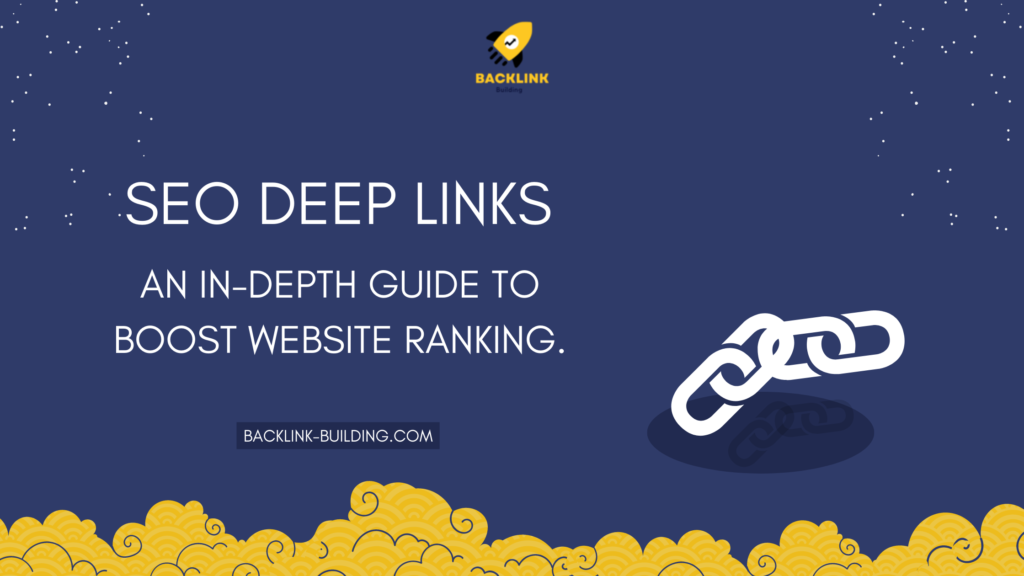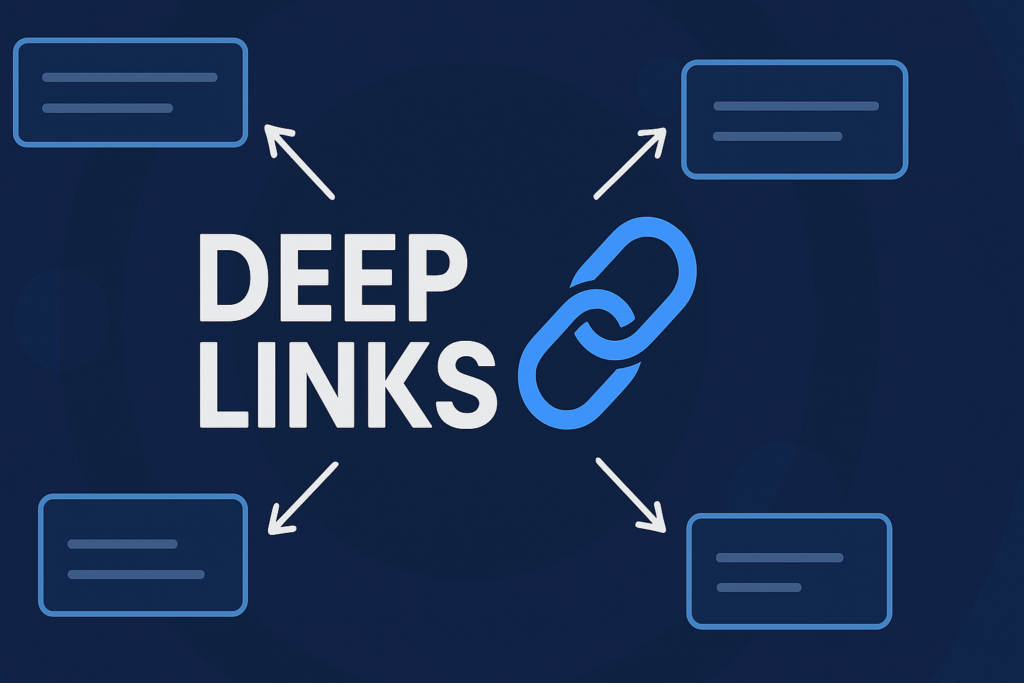
As an SEO Professional, you might have heard of links such as backlinks, internal, and SEO deep links. But what exactly are SEO deep links?
You may have heard of these links to boost your website rankings. But what are they, and how can they help you?
This blog post will answer your questions about SEO deep links. We’ll start by defining a deep link in SEO, and then we’ll give you some pros and cons of using them. Next, we’ll walk you through a step-by-step guide for building SEO deep links. And finally, we’ll answer some frequently asked questions about these links. So read on to learn everything you need about SEO Deep Links!
So, let’s start by defining Deep Links,
What Are Deep Links In SEO?

A deep link is a hyperlink that directs a user to a specific page within a website rather than the homepage. These links are essential for SEO because they help search engines crawl and index all the pages on your website, improving your overall SEO ranking.
It can also improve user experience; as deep links direct users to the relevant pages they’re looking for. And if you have a large website with multiple categories and subcategories, deep links can make it easier for users to navigate and find the information they want.
Now that we’ve defined SEO deep links let’s examine some of the pros and cons of using them.
Pros And Cons Of Deep Links
Pros
Improved SEO Ranking
No one want’s their website buried on the second or third page of search results. They can help improve your overall SEO ranking by making it easier for search engines to crawl and index all the pages on your website.
Improved User Experience
Deep links make it easier for users to navigate and find the specific information they’re looking for on your site. Even Google has mentioned regarding user experience and SEO ranking, “Pages with a poor user experience may not rank as highly.”
Increased Website Traffic
Improving SEO rankings and user experience can ultimately result in increased website traffic. Once the traffic flows in, deep links make it easier for users to navigate and explore your website, potentially leading to higher conversion rates.
Higher Conversion Rates
Along with increased website traffic, deep links can also lead to higher conversion rates as users are directed to the specific pages they want to visit on your site.
Better Internal Linking Structure
Deep links help create a better internal linking structure on your website, making it easier for search engines and users to navigate and find relevant information.
Improved Brand Credibility
A well-structured and easy-to-navigate website helps build trust and credibility with potential customers or clients.
Cons
Time-Consuming
Creating deep links for a large website can take time and effort. It’s essential to carefully plan and strategize where you should place your deep links for maximum SEO and user experience benefits.
Requires Ongoing Maintenance
Maintaining these links requires continuous effort as your website grows and changes. You may need to regularly update and check your deep links to ensure they’re still relevant and working correctly.
It Can Be Difficult For Smaller Websites
If you have a small website with few pages, creating these links may not have as much of an impact on SEO rankings or user experience. It’s essential to consider the size and structure of your website before investing time and resources into implementing SEO deep links.
It May Not Make A Significant Difference In SEO Rankings
While they can improve SEO rankings, it’s just one factor among many that search engines use to determine where your website ranks in search results. SEO deep links alone might not make a significant difference, but they can be valuable to your overall SEO strategy.
Now that we’ve looked at the pros and cons let’s dive into how to build SEO deep links.
Step By Step Guide For Building Links

Identify Relevant Pages On Your Website
Start by listing all the essential pages on your website that you want to improve SEO rankings for and potentially drive more traffic. This could include category pages, product pages, blog posts, or critical pages.
You can begin to plan and strategize where to place these links by listing all the relevant pages.
Research Keywords
Using a tool like Google Keyword Planner, research potential keywords for the pages on your website that you want to improve SEO rankings. This can help guide where and how to incorporate deep links within your content. It is also essential to consider the user’s intent when selecting keywords. However, using long-tail keywords in these links also has potential SEO benefits.
Place Deep Links In Relevant Content
Once you’ve identified relevant pages and researched potential keywords, start incorporating those deep links within relevant content on your website. For example, a blog post about a specific product could include a deep link to the product page.
Also, Place your SEO deep links in natural and relevant places within your content instead of randomly inserting them.
Regularly Check And Update Deep Links
It’s essential to regularly check and update your deep links as your website changes and grows over time. This helps ensure they’re still relevant and working correctly for improved SEO rankings and user experience.
Google’s Comment On SEO Deep Links
Some SEO professionals have speculated that Google may not crawl and index deep links as effectively as top-level pages. Still, according to Google’s John Mueller, this is not the case. In a webmaster hangout, Mueller stated that “deep links are treated like any other links.” However, he did recommend focusing on the top-level pages for SEO purposes.
Google also has guidelines for SEO deep links in their Search Quality Evaluator Guidelines. They recommend deep links to be “naturally integrated into the content” and “useful and relevant for the query.”
FAQs
Q- How Do These Links Differ From Regular links?
Regular links, also known as surface links, direct users to the homepage of a website. On the other hand, these links direct users to specific pages within a website.
Q- Will Creating SEO Deep Links Guarantee Improved SEO Rankings?
No, creating these links is just one factor among many that search engines use to determine where your website ranks in search results. However, it can still improve your overall SEO strategy and potentially lead to increased website traffic and higher conversion rates.
Q- Can I Create These links For My Small Business Website?
Yes, any size or type of website can benefit from implementing these links. It’s essential to consider the size and structure of your website before investing time and resources into creating SEO deep links.
Final Thoughts
Now that you better understand SEO deep links and how they can benefit your website consider incorporating them into your overall SEO strategy. Regularly check and update your deep links for improved SEO rankings and user experience.
If you have questions regarding SEO deep links, feel free to leave your questions in the comment section. We will be happy to answer you.
Thanks for reading 🙂


